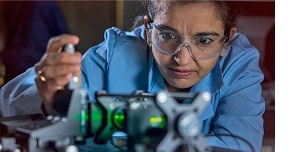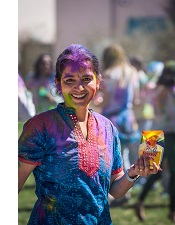

As a staff scientist and team leader at Los Alamos National
Laboratory, Dr. Harshini Mukundan has focused herresearch on
developing rapid diagnostics for a number of diseases including
sepsis, tuberculosis and COVID-19. In addition, she mentors and
inspires up-and-coming and future scientists as an AAAS IF/THEN®
ambassador. IF/THEN®'s mission is to advance women in STEM fields by
"by empowering current innovators and inspiring the next generation
of pioneers." Dr. Mukundan shares with us her experiences as an
Asian woman scientist.
What drew you to the sciences?
 I have always been a very
curious person. As a child, I am sure I drove my parents insane with
my relentless questioning. I wondered about everything from natural
processes to social norms. I think that was an expression of
scientific curiosity – but I did not realize that until much later.
I was also very interested in creative pursuits – writing, poetry,
drama and dancing. If anything, regular classroom classes in science
and mathematics were interesting, but not intriguing or inspiring. I
pursued an undergraduate education in microbiology driven more by my
academic performance than a true passion for the sciences.
I have always been a very
curious person. As a child, I am sure I drove my parents insane with
my relentless questioning. I wondered about everything from natural
processes to social norms. I think that was an expression of
scientific curiosity – but I did not realize that until much later.
I was also very interested in creative pursuits – writing, poetry,
drama and dancing. If anything, regular classroom classes in science
and mathematics were interesting, but not intriguing or inspiring. I
pursued an undergraduate education in microbiology driven more by my
academic performance than a true passion for the sciences.
It was not until I
enrolled for my masters in microbiology, and had an opportunity to
pursue my research thesis at the National Institute of immunology,
that I was truly drawn to the sciences. I fell in love with
exercising the concepts that I had learned in the classroom towards
answering interesting questions, having an endless avenue to
exercise my curiosity – and my artistic temperament- both at the
same time. I am convinced now, more than ever, that it is important
for children to truly understand what a future in science can look
like–-early in life--so that they can look towards it as an
opportunity to exercise their fascination and curiosity, rather than
an exhausting academic exercise.
What has been the most rewarding aspect
of your career? And the most challenging?
There are two aspects of my career that have been the most rewarding
(and are equally so). The first is the ability to work with, mentor,
influence and train the next generation of science enthusiasts.
Watching students and trainees that you worked with grow and excel
is extremely fulfilling. To quote Louis Armstrong “I watch these
children, I watch them grow – they will know more than I will ever
know – and I think to myself, oh! What a wonderful world!!”.
The second most rewarding aspect is working out our solutions to
complex challenges and problems – for the very first time! As a
scientist in a US National Laboratory, I work in the applied science
arena- focused on developing better universal diagnostics for
emerging infectious diseases. Every little development, every little
challenge overcome, is a step towards our “pie in the sky” goals and
is extremely rewarding. This, perhaps, is also the most challenging
aspect of my career. I always say that if all the experiments that
made their way to my Ph.D thesis were to be performed end-to-end, I
would have been done in 6 months, not 5 years! Science is about
trying, and failing, and trying again, until you succeed. This can
be extremely challenging. But if you persevere, the rewards are all
the more sweet, and you can potentially become a patient, rational,
tolerant person in the process too!
We hear about the bias women face in
STEM. Have you personally experienced any and how did you handle
them?
In his book, Sapiens, Yuval Harrari notes – and I
paraphrase – that one hierarchy that has been of supreme importance
in all known human societies is that of gender. Being a woman, and a
woman of color, and in STEM – I certainly have experienced my share
of discrimination and bias. Most of my experiences have been subtle
– in fact, some are even difficult to recognize in the face of it.
For instance, people feel the need to compliment you on your looks
or your outfit in a professional environment, because they are
trying to be polite or nice! However, each and every one of these
experiences have made me stronger, and emboldened me to be an
outspoken advocate of women, and of women in STEM.
Today, I feel confident and comfortable addressing bias when I see
it. But that confidence did not come easily. I have been fortunate
enough to have some amazing women mentors in my life, women who have
helped me identify and respond appropriately. I want to give back,
mentor and inspire the next generation of young girls to pursue STEM
careers which is why I am honored to be a AAAS IF/THEN Ambassador.
There is a huge gender disparity in STEM and the IF/THEN Initiative
is working to change the culture by educating girls that ‘IF they
can see it, THEN they can be it’. I have benefitted from TED talks
and books from other women who have handled such situations. The
most important lesson that I have learned is that when we see bias –
conscious or unconscious, subtle or not – we need to speak out and
address it immediately. I have practiced that to the best of my
ability, I strive to be there – as a friend, a fellow STEMinist and
a mentor, for women who may need such support.
 Indian women have been
trailblazers in many ways – we have had women prime ministers and
presidents, company CEO’s to look up to, to admire, to aspire.
However, there are still social definitions of women in society that
you have to swim against. As a young girl, I was asked if I would be
able to find a suitable groom if I studied too much. As a married
woman enrolled in an aggressive PhD program, people wondered how I
would manage my family responsibilities. When I travel for
conferences and meetings, I am often asked who takes care of my
children. These are questions that will never be asked of a man –
and are clearly a consequence of gender norms and definitions. I
have been fortunate to have family members that have always
encouraged me to be myself. My grandfather, for instance, always
encouraged me to pursue my dreams. My husband has been my rock –
respecting my ambitions and my dreams in every possible way. One of
the lessons I have learned from my own personal experiences is that
it is important to raise men who believe in gender equality and
respect, just as much as it is to raise strong daughters!
Indian women have been
trailblazers in many ways – we have had women prime ministers and
presidents, company CEO’s to look up to, to admire, to aspire.
However, there are still social definitions of women in society that
you have to swim against. As a young girl, I was asked if I would be
able to find a suitable groom if I studied too much. As a married
woman enrolled in an aggressive PhD program, people wondered how I
would manage my family responsibilities. When I travel for
conferences and meetings, I am often asked who takes care of my
children. These are questions that will never be asked of a man –
and are clearly a consequence of gender norms and definitions. I
have been fortunate to have family members that have always
encouraged me to be myself. My grandfather, for instance, always
encouraged me to pursue my dreams. My husband has been my rock –
respecting my ambitions and my dreams in every possible way. One of
the lessons I have learned from my own personal experiences is that
it is important to raise men who believe in gender equality and
respect, just as much as it is to raise strong daughters!
– respecting my ambitions and my dreams in every possible way. One
of the lessons I have learned from my own personal experiences is
that it is important to raise men who believe in gender equality and
respect, just as much as it is to raise strong daughters!
What is one piece of advice that you wish you had received
earlier?
That it's OK to be different. In fact, it's cool to be different.
It’s ok to be yourself, even if it does not conform to societal
expectations and norms. If you look back in history at the people
that we remember, whether that's men or women, it's always the
people that are different that are remembered. There's only so far
you can go by being a conformist.